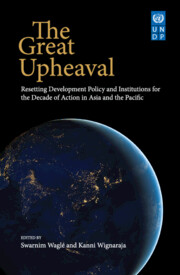Book contents
- Frontmatter
- Contents
- List of Figures
- List of Tables
- List of Boxes
- List of Appendices
- List of Abbreviations
- Foreword
- Acknowledgements
- Introduction
- 1 Aligning Sovereign Debt Financing with Climate Action in the Asia-Pacific Region
- 2 Melting Glaciers, Threatened Livelihoods: Confronting Climate Change to Save the Third Pole
- 3 Accelerating Universal Digital Connectivity
- 4 The Post-COVID-19 Future for Global Value Chains
- 5 Is Southeast Asia Falling into a Latin American–Style Middle-Income Trap?
- 6 Equality of Opportunity as a Measure of Development
- 7 Insights for Policymaking from the Multidimensional Poverty Index
- 8 COVID-19 and Human Security
- 9 Making COVID-19 Vaccine Universally Accessible
- 10 Enhancing the Provision of Global Public Goods: Ready for More Realism?
- 11 Asian-Pacific Regional Cooperation in the Post-COVID-19 Era
- 12 Pandemic Governance and Human Development: Early Lessons from Asia
- 13 Seven Lessons for Development Policy from the COVID-19 Pandemic
- About the Contributors
- Index
6 - Equality of Opportunity as a Measure of Development
Published online by Cambridge University Press: 28 February 2022
- Frontmatter
- Contents
- List of Figures
- List of Tables
- List of Boxes
- List of Appendices
- List of Abbreviations
- Foreword
- Acknowledgements
- Introduction
- 1 Aligning Sovereign Debt Financing with Climate Action in the Asia-Pacific Region
- 2 Melting Glaciers, Threatened Livelihoods: Confronting Climate Change to Save the Third Pole
- 3 Accelerating Universal Digital Connectivity
- 4 The Post-COVID-19 Future for Global Value Chains
- 5 Is Southeast Asia Falling into a Latin American–Style Middle-Income Trap?
- 6 Equality of Opportunity as a Measure of Development
- 7 Insights for Policymaking from the Multidimensional Poverty Index
- 8 COVID-19 and Human Security
- 9 Making COVID-19 Vaccine Universally Accessible
- 10 Enhancing the Provision of Global Public Goods: Ready for More Realism?
- 11 Asian-Pacific Regional Cooperation in the Post-COVID-19 Era
- 12 Pandemic Governance and Human Development: Early Lessons from Asia
- 13 Seven Lessons for Development Policy from the COVID-19 Pandemic
- About the Contributors
- Index
Summary
INTRODUCTION: DEVELOPMENT ENTAILS EQUALIZING OPP ORTUNITIES
A society – even one that has achieved a high level of average income, education and public health outcomes – cannot be considered developed if its ordinary citizens do not believe that life is fair. But what exactly is fairness? However varied, most answers have their root in some notion of equality – equality before the law, equality of representation in politics, and so on. Building upon the work of one of the present authors (Roemer, 1996, 1998) we propose that fairness means that citizens have equal opportunities to achieve their goals. We will define the roles played by choices and circumstances in the origins of inequality and go on to propose metrics for measuring, and policies for achieving, equality of opportunity. We will conclude with a set of recommendations for policymakers.
We consider the goals of citizens as those that prior work in development has identified as important and influential in policy: Individuals seek to achieve a high income, good health, the empowerment afforded by education and other such objectives as measured and reported in past United Nations Development Programme (UNDP) Human Development Reports. We will refer to these goals as the objectives of individuals.
What does it mean for individuals to have equal opportunities to achieve these objectives? We postulate three categories of inputs that determine their success in achieving these objectives. The first set of factors are the individual's choices, which includes the effort she puts in, the decision of which sector to work in, and so on. The second set includes those that we call the individual's circumstances, which are outside her control. This includes all individual-specific factors relevant for success but which the individual did not choose. For example, individuals do not choose the ethnic group to which they belong, the socioeconomic status of their families of origin, their rural or urban background, or their gender. But it is evident that these things will matter at least to a degree in determining their lot in life. Individuals ought to be held responsible for their choices, but not their circumstances. The final category is public policy which shapes the economic and social environment in which individuals live, the benefits they receive and, importantly, the relative importance of their circumstances versus their choices.
- Type
- Chapter
- Information
- The Great UpheavalResetting Development Policy and Institutions in the Asia-Pacific, pp. 150 - 168Publisher: Cambridge University PressPrint publication year: 2022

